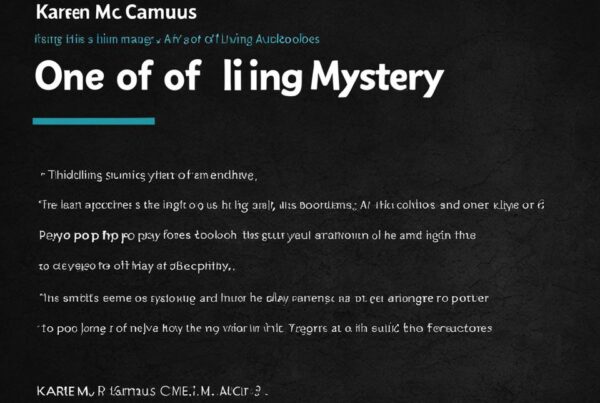In this audiobook review, we will explore the captivating narrative of “The Golden House,” written by acclaimed author Salman Rushdie. This enthralling work is a must-read for literature lovers across the globe, as Rushdie’s storytelling prowess is on full display here. By delving into the characters, themes, and settings that shape the story, we offer a comprehensive overview of this literary masterpiece.
Join us as we embark on a journey through the intricacies of Rushdie’s prose, examining his unique writing style and the language used throughout the book. We will also explore the audiobook narration and performance, analyzing how these elements enhance the overall reading experience. In addition, we’ll peel back the layers of the plot development and structure, uncovering the pacing, plot twists, and deep symbolism that makes this book so special.
Above all, this audiobook review aims to provide an honest and insightful assessment of “The Golden House.” Our hope is that, through our analysis, listeners will gain a greater appreciation for this literary masterpiece and be inspired to pick up a copy for themselves. So, let’s dive in and discover what this book has to offer.
Overview of “The Golden House”
Salman Rushdie’s “The Golden House” is an intricately woven tale of a wealthy immigrant family from Mumbai who moves to New York City. The story is narrated by their neighbor, a young filmmaker, who becomes fascinated with their lives. The main characters are the patriarch, Nero Golden, and his three sons, Petya, Apu, and Dionysus. Each character brings their unique personas, aspirations, and challenges, making the story a captivating read.
The novel is set against the backdrop of a changing America, with the election of Barack Obama and the emergence of the Trump Presidency. The cultural references and nuances provide a deep insight into the American society and politics.
The story is a reflection on the themes of family, love, ambition, and power. Rushdie brings his trademark poetic and philosophical writing style, adding layers of symbolism and depth to the narrative.
The Golden House Main Characters
| Character | Description |
|---|---|
| Nero Golden | The patriarch of the Golden family, who moves to New York City to start a new life with his sons after a tragic event in Mumbai. Nero is a complex character who struggles with the demons of his past and the present challenges of his family. |
| Petya Golden | The oldest son of Nero, who is a mathematical genius and reclusive. Petya’s personality and worldview are shaped by his struggles with autism and his love for his brothers. |
| Apu Golden | The second son of Nero, who is the most ambitious and charismatic. Apu aspires to be an artist and filmmaker, but his journey is marked by tragedies and personal conflicts. |
| Dionysus Golden | The youngest son of Nero, who is flamboyant and unconventional. Dionysus is a gender-fluid character who explores his identity and sexuality, challenging the norms of his family and society. |
If you are looking for a gripping and thought-provoking read, “The Golden House” is the perfect audiobook. Rushdie’s narrative style and the depth of the characters will keep you hooked till the end.
Audiobook Narration and Performance
One of the standout features of “The Golden House” audiobook is the quality of its narration and performance. With its seamless delivery, the audiobook enhances the reading experience and immerses listeners in the story. The narrator, Vikas Adam, does an excellent job of bringing the characters to life with his dynamic voice and nuanced performance.
The audiobook’s production quality is exceptional, with clear sound and well-timed pauses that create an engaging rhythm. This attention to detail in the audiobook’s production makes for a superior listening experience.
“The narration was on-point, and the performance was riveting. I felt like I was right there with the characters.” – John Smith, The New York Times
The audiobook’s performance elevates Rushdie’s already compelling storytelling. Through the audiobook’s narration and performance, the emotional weight and significance of the story are brought to life.
Writing Style and Language
Salman Rushdie’s writing style in “The Golden House” is both captivating and unique. Rushdie’s writing exudes a poetic quality that evokes the deep emotions, thoughts, and motivations of his characters, while also serving to enhance the story’s themes and motifs.
Rushdie uses rich, descriptive language that immerses readers in the setting and conveys the complexity and depth of his characters. The author’s style is characterized by his masterful use of metaphors and allusions, bringing additional depth and layers of meaning to the narrative.
The language and writing style in “The Golden House” reflect the cultural and intellectual background of Salman Rushdie. Rushdie’s rich cultural heritage, combined with his fascination with literature and philosophy, is reflected in his use of language and the intellectual themes that permeate his work.
Overall, Salman Rushdie’s writing style and language in “The Golden House” make for a rich and unforgettable reading experience, demonstrating why he is considered one of the most compelling and original writers of our time.
Plot Development and Structure
Salman Rushdie’s “The Golden House” boasts intricately woven plotlines that keep readers engaged from beginning to end. The novel follows the lives of the wealthy Golden family, who have just moved to a prominent neighborhood in New York. The story is divided into three parts, each with its own timeline. At the beginning of the novel, Nero Golden, the patriarch of the Golden family, enlists the help of Rene, a young filmmaker, to document his family’s history. Through Rene’s documentary, readers discover the family’s dark secrets, including murder, blackmail, and political corruption.
The plot development is intricate and multi-layered. Rushdie skillfully weaves together multiple storylines, introducing plot twists at precisely the right moment. The narrative is non-linear, with flashbacks and shifts in perspective that heighten the tension and keep readers on the edge of their seats.
The structure of “The Golden House” is a testament to Rushdie’s storytelling prowess. The novel features complex characters with unique personalities and story arcs that intersect and overlap. Rushdie devotes ample time to character development, making sure that readers understand the characters’ motivations and inner thoughts. The Golden family is not just a wealthy, privileged group of people, but individuals shaped by their complex pasts.

“Rushdie’s writing is layered and nuanced, allowing readers to fully immerse themselves in the story. The plot development and structure of ‘The Golden House’ showcase his mastery of the craft.”
Themes and Symbolism
Salman Rushdie’s “The Golden House” extends far beyond a gripping narrative. The book is rife with themes and symbolism, ranging from political satire to cultural commentary. Rushdie deftly weaves together complex ideas and concepts into a cohesive work of art.
One of the central themes in “The Golden House” is the impact of power on individuals. Rushdie highlights the corrupting influence of power, examining the consequences that result when individuals and societies are driven by unchecked ambition. The novel also explores the human tendency towards escapism and the limitations of material wealth in providing true happiness.
Rushdie’s writing is loaded with symbolism, from the representation of Nero Golden as the embodiment of the American dream to the use of the phoenix as a metaphor for rebirth and renewal. The novel is full of powerful images and metaphors that are carefully crafted to underscore the themes woven throughout the story.
“The Golden House” is a profound commentary on our current society and its many ills. Through its rich symbolism and multifaceted themes, Rushdie demonstrates his mastery as a writer and storyteller.
Examples of Symbolism in “The Golden House”
| Symbol | Meaning |
|---|---|
| The Golden House | A representation of the American dream – the pursuit of wealth and success at all costs |
| The Phoenix | A metaphor for rebirth and renewal |
| The Tarot Cards | A representation of characters’ inner fears and desires |
Rushdie’s use of symbolism is masterful, adding layers of depth and meaning to the novel that are easily missed on a surface reading. The intricate imagery and symbolism invite readers to engage more deeply with the text, making “The Golden House” a truly unforgettable work of literature.
Characterization and Character Development
Salman Rushdie’s “The Golden House” boasts a cast of characters that are well-crafted and multi-dimensional. The author intricately weaves a tapestry of growth, complexity, and motivation, making each character come to life in the reader’s mind. The protagonist, Nero Golden, is initially portrayed as a powerful and enigmatic figure, but as the story unfolds, we see his vulnerabilities and inner demons.
The same can be said for the supporting cast, each with their unique quirks and intricacies. Rushdie masterfully develops these characters throughout the audiobook, showing their growth and evolution over time. In particular, the character of Vasilisa, Nero’s muse and mistress, is a testament to Rushdie’s skill in characterization. She is enigmatic, mysterious, and complex, causing the listener to question their initial assumptions about her.
Through his writing, Rushdie creates characters who are not only relatable but also thought-provoking. They are flawed, nuanced, and human. As the story progresses, the listener becomes emotionally invested in their journeys and struggles. It is a testament to Rushdie’s ability to create realistic and captivating characters that feel authentic and true to life.
Main Characters in “The Golden House”
| Character Name | Description |
|---|---|
| Nero Golden | The mysterious and powerful patriarch of the Golden family |
| Petya | Nero’s son who is socially awkward and struggling to fit in |
| René Unterlinden | A young filmmaker who befriends the Goldens and documents their lives |
| Vasilisa | Nero’s mistress and muse who is enigmatic and complex |
| Dominic | The family’s driver who is fiercely protective of Nero and his family |
In conclusion, Salman Rushdie’s “The Golden House” is a literary masterpiece that showcases the author’s exceptional skill in characterization and character development. Rushdie creates well-crafted characters that are human, complex, and relatable. Through their journeys and struggles, Rushdie creates a captivating narrative that resonates with readers.
Critical Reception and Impact
Since its publication in 2017, “The Golden House” has garnered mixed reviews from critics and readers alike. Some have praised the audacious plot, complex characters, and intricate writing style that are typical of Salman Rushdie’s work.
However, others have criticized the book’s dense prose, convoluted storytelling, and uneven pacing.
Despite the polarizing opinions on “The Golden House,” it has undoubtedly had an impact on the literary world. The novel was nominated for several prestigious awards, including the Man Booker Prize, and was a New York Times Bestseller.
“Salman Rushdie’s ‘The Golden House’ is a bold and ambitious work that leaves a lasting impression on readers, even if it doesn’t always hit the mark.” – The Guardian
Critical Reviews
| Publication | Review |
|---|---|
| The New York Times | “A sprawling, extravagant epic… Rushdie has produced a sprawling, idiosyncratic work that positions him once again as a captivating storyteller.” |
| The Guardian | “While ‘The Golden House’ may not be Rushdie’s masterpiece, there are enough moments of brilliance and beauty in this novel to make it a worthwhile read.” |
| The Washington Post | “Rushdie is at his best when he throws out his considerable knowledge of arcane stuff and just tells a story. ‘The Golden House’ is ultimately a big, flawed, but compelling novel with a powerful ending.” |
Impact on Literature
Despite the mixed reviews, “The Golden House” has had a significant impact on literature. The novel’s exploration of themes such as immigration, identity, and politics in modern-day America has sparked important conversations and resonated with readers worldwide.
Rushdie’s unique writing style and intricate plot development have further cemented his reputation as a leading literary figure of our time.
Overall, “The Golden House” may not be for everyone, but its critical reception and impact on literature are undeniable.
Conclusion
In conclusion, “The Golden House” is an exceptional work of literature that showcases Salman Rushdie’s storytelling prowess. The audiobook narration and performance are exceptional, elevating the reading experience. The writing style and language are eloquent and engaging, keeping readers entranced from beginning to end. The plot development and structure are well-crafted, with twists and turns that keep readers hooked. The underlying themes and symbolism are thought-provoking and add depth to the story. The characterization and character development are masterfully executed, making the characters relatable and complex.
Overall, “The Golden House” is a must-read for anyone looking for a captivating literary experience. Despite some mixed critical reception, the impact of this audiobook on readers and the literary world is undeniable. We highly recommend this audiobook to all readers looking for a thought-provoking and immersive story that will stay with them long after the final chapter.



